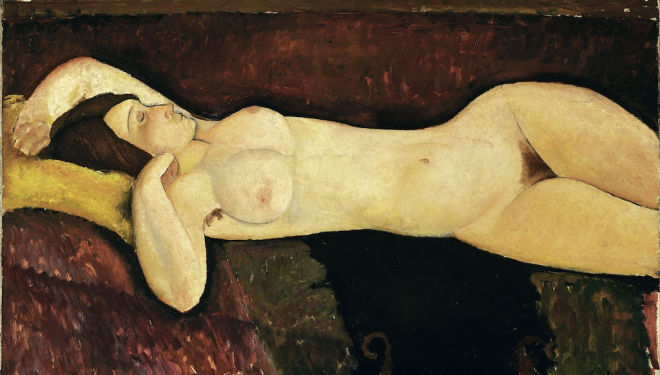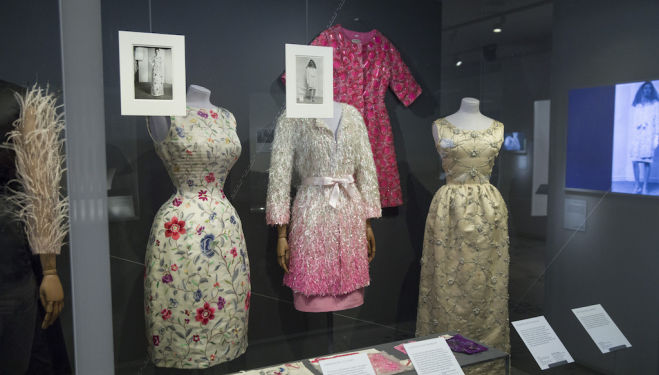
The Titanic, the Normandie, the Queen Mary, and the Canberra: these are among the greatest ocean liners ever to have sailed the seas. Symbols of modernity, prestige, design and technological innovation, these ships, for the first time in history, are the focus of a mesmerising new exhibition at the V&A.
From immigrant transportation vessels and 'tools of state' to troop-carriers during war and leisure palaces, the exhibition traces the social, architectural, design, fashion and technological history of ocean liners from 1850 – 1962. Curated thematically by Ghislaine Wood and Daniel Finamore, Ocean Liners is a theatrical showcase of one of history's most celebrated forms of transport.

Normandie in New York, 1935-39 © Collection French Lines
Smashing expectations, Ocean Liners entertains and informs simultaneously; it's as much about the aesthetic on board as their socio-economic impact on land. And thankfully, the 250 exhibited objects bring a long gone era joyfully back to life. The opening, however, is really rather flat. The endless advertising posters, ticket booking pamphlets and promotional brochures hung in a bric-a-brac fashion triggers a fast onset ennui. Swiftly board the gangplank and journey into the glittering corners of their hulking interiors.
Samples of nineteenth-century rococo paneling, glorious decorative tiling, gilded stucco neo-classical designs, and ‘minimalist’ contemporary sofas, cushions and tables transport us back to the glamorous interiors of some of the most luxurious ships in the world: the Kronprinz Wilhelm, the Normandie, Queen Mary and sister-ship Queen Elizabeth.
Seen as symbols of national political power throughout the twentieth century, these 'tools of state' became floating showcases of national prestige, ingenuity, innovative design, and the focal point of international rivalries. As their political status grew, so did their splendour. Governments enlisted the best designers, engineers and architects to develop floating cities like no other. The curators have adopted a more is less approach in 'The Politics of Style' galleries; navigating through all of the sculpture, drawing, photographs, film footage, maquettes and furniture on display is a little overwhelming. But motor through the engine room and you will eventually stumble out on deck. 
Diamond and pearl tiara saved from the Lusitania, Cartier, Paris, 1909. Marian Gérard, Cartier Collection © Cartier.jpg
From an exploration of the leisure activities and interiors of third-class cabins to a presentation of the elaborate dinner services and luxury travelling cases of first-class passengers, ‘Life on Board’ explores the complex sociology on board these ships. The gallery's central digital installation, and indeed the highlight piece, projects a glamours woman enacting the nightly grande descente (as the walk from upper deck to lounge was known).
It’s not all glitz and glamour, though. Salvaged from the sinking Lusitania in 1915, the super sparkly Cartier tiara, once owned by Lady Marguerite Allan, serves as a poignant reminder of ocean liners’ often tragic fate. Following its attack by a German U-boat, allied forces produced a swathe of propaganda to encourage American soldiers to enlist. Fred Spear's ghostly poster of a drowning mother cradling her dead child together with the salvaged boiserie panel from the sinking Titanic are among the most spine-shivering exhibits in the show.
Symbols of a golden age long forgotten, these magnificent vessels shaped the world we know today. But the V&A's Ocean Liners is not an exercise in nostalgia, it’s a modern exercise in design history.
It's fun, glitzy, and really quite a ride. Bon Voyage.
| What | Ocean Liners: Speed & Style, review, V&A |
| Where | V&A, South Kensington, Cromwell Road, London, SW7 2RL | MAP |
| Nearest tube | South Kensington (underground) |
| When |
03 Feb 18 – 10 Jun 18, 10:00 AM – 6:00 PM |
| Price | £18 |
| Website | Click for more information |



